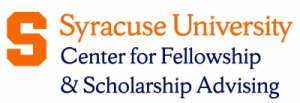The Boren Scholarship in Action with Frederick (Rick) Cieri III (’17)
Frederick (Rick) Cieri received the opportunity of a lifetime to study for a year in São Paulo, Brazil with the Boren Scholarship. Rick has gone to Brazil to study Portuguese, which is deemed a “critical language”: by the Boren Scholarship since it is less commonly taught in the United States. Rick applied to the Boren Scholarship as a way to support his language goals, fund his study abroad experience, and prepare him for his future as Foreign Service Officer. He had spent a semester in Strasbourg, France and then participated in a summer abroad semester in Madrid, Spain. We interviewed Rick to see how he is finding his experience in São Paulo.
What has been your day-to-day experience in Sao Paolo?
I have adjusted rather well to the fast-paced life of São Paulo. The city is massive, so it is easy to feel overwhelmed! Nevertheless, my neighborhood, Perdizes, is a great part of the city with diverse restaurants and shops. I often spend my days in my neighborhood, attending my classes at PUC (my Brazilian university), and practicing my Portuguese with friends. During the weekends, my abroad program provides different activities throughout the city, and I often go out at night with some of my Brazilian friends.
How does learning Portuguese compare to the other languages you know?
Portuguese is rather similar to Spanish, Italian, and French – the other three languages I have already studied at SU. In my opinion, this poses its own set of difficulties, because I have to work extra hard to ensure that I can keep these four languages separated in my mind. Nevertheless, I am excited to say that I am studying a language that is considered a critical language.
Do you think it would benefit more students to pursue learning a language from the critical language list?
I think more American students should consider studying a language in general, and they should definitely consider selecting a critical language. Knowledge of foreign languages (especially critical languages) opens doors and provides graduates with opportunities that they perhaps never thought could be available to them, such as employment in foreign countries or opportunities to travel with work.
What was your experience being in Brazil during the Olympics and Paralympics?
I have been in Brazil since before the Olympics began. In São Paulo, there were Olympic soccer matches, so the city was especially lively on these nights. Although any time the Brazil soccer teams were playing, the bars were a very exciting place to be! Recently, I visited Rio de Janeiro for the last weekend of the Paralympics. It was truly awesome to see such a global presence in Rio. There was even a medal ceremony occurring at a venue right outside the Airbnb in which I was staying. It was very neat to be in the proximity of such important global events as the Olympics and Paralympics. I definitely want to attend the Olympics/Paralympics someday in the future.
How does it feel to be away from home for so long?
I am fortunate to have such a loving family and supportive friends and I miss them every day. Because I transferred to SU in my sophomore year, I will have actually only spent three semesters on campus at SU out of my entire four years of undergrad. I have loved every moment I have spent with my friends on campus at SU. I miss them all as well. Although I have days that I get very homesick, I know that I am doing well for myself and for my future. I am especially eager, however, to come home for two weeks for Christmas to see my family and friends.
What lessons have you learned in your study in Brazil that you will bring back to the U.S.?
I will be more grateful for the lack of bureaucracy in the United States and the fact that I can usually accomplish a task in a single location. In Brazil a single task might require a day’s worth of running from building to building around the city to get the right documents in order. As days pass, I also become more grateful for the lack of political corruption in the United States as compared to the current political situation in Brazil.
What do you hope to accomplish during your year in Brazil?
I hope to be fluent in Portuguese by the time I leave. I would like to successfully complete three courses in Portuguese at my Brazilian university. I would also like to have some plans for what I will do when I return to the United States in May/June – whether they are plans for a summer internship or more long term, such as a job or graduate school.
We heard you applied for the Fulbright Scholarship. How does it differ from the Boren Scholarship?
The Fulbright application was in some ways like the Boren application. The process required meticulous writing of the two essays. I was luckily able to work with CFSA to get started on the writing process in June while living near campus before I left for Brazil.. The Fulbright application is different in the sense that you typically apply to a specific country, while the Boren requires applicants to find a study abroad program that will support their language goals and create a budget document.
